
Elevator commissioning engineers specialize in testing and verifying elevator systems to ensure safe and efficient operation according to industry standards and building codes. They perform functional performance tests, troubleshoot installation issues, and coordinate with project managers and manufacturers for seamless system integration. Proficiency in electrical systems, control panels, and safety regulations is essential for accurate commissioning and certification.
Individuals with strong problem-solving skills and a keen attention to detail are likely well-suited for the role of an elevator commissioning engineer. Those who thrive in dynamic environments, can work under pressure, and have a solid understanding of mechanical and electrical systems probably find this job rewarding. However, individuals who prefer routine tasks or lack physical stamina might face challenges in adapting to the demands of this position.
Qualification
Elevator commissioning engineers typically require a bachelor's degree in electrical, mechanical, or civil engineering, along with specialized training in elevator systems and safety codes. Proficiency in interpreting technical drawings, conducting system tests, and troubleshooting electrical and mechanical components is essential. Industry certifications such as NICET or NEIEP further validate expertise in elevator installation and regulatory compliance.
Responsibility
Elevator commissioning engineers are responsible for testing and verifying the performance of elevator systems to ensure compliance with safety regulations and design specifications. They conduct inspections, troubleshoot technical issues, and fine-tune control systems to optimize functionality and passenger safety. Coordination with installation teams and maintaining detailed commissioning reports are critical tasks to guarantee successful project handover.
Benefit
Elevator commissioning engineers likely play a crucial role in ensuring that elevator systems operate safely and efficiently before being put into service, enhancing building safety and occupant confidence. The position probably offers benefits such as gaining specialized technical expertise, improving problem-solving skills, and increasing employability in the construction and building maintenance industries. There is a strong probability that the role comes with opportunities for career advancement and competitive compensation due to the specialized nature of the work.
Challenge
Elevator commissioning engineers likely encounter complex technical challenges involving the integration of mechanical, electrical, and software systems to ensure safe and efficient operation. Troubleshooting issues during final testing phases may require a high level of expertise and adaptability under tight project deadlines. The role probably demands continuous learning to stay updated with evolving industry standards and safety regulations.
Career Advancement
Elevator commissioning engineers play a critical role in ensuring the safety and functionality of elevator systems, providing a strong foundation for career advancement in the vertical transportation industry. Mastery of technical skills and compliance with industry standards opens pathways to senior engineering roles, project management, and specialized consulting positions. Continuous professional development and certifications, such as those from the National Association of Elevator Contractors (NAEC), significantly enhance career growth opportunities.
Key Terms
Safety Inspection
Elevator commissioning engineers conduct comprehensive safety inspections to ensure compliance with national safety standards and building codes, minimizing the risk of mechanical failures and accidents. They perform detailed functional tests on emergency brakes, door interlocks, and control systems, identifying issues before elevators are operational. Their expertise in adhering to ISO and ASME safety regulations helps guarantee passenger protection and proper elevator performance.
Control Panel Calibration
Elevator commissioning engineers specialize in control panel calibration to ensure optimal performance and safety of elevator systems according to industry standards. Precise calibration of sensors, controllers, and safety devices is critical for accurate diagnostics and smooth operation during initial setup and maintenance phases. Mastery in control panel programming and testing protocols reduces downtime and enhances elevator reliability in commercial and residential buildings.
Mechanical Alignment
Elevator commissioning engineers specializing in mechanical alignment ensure precise installation and adjustment of elevator components to guarantee smooth and safe operation. They utilize laser measurement tools and alignment gauges to verify the verticality and parallelism of guide rails, reducing vibration and wear. Accurate mechanical alignment is critical for optimizing elevator performance, reliability, and passenger safety during the commissioning process.
Handover Documentation
Elevator commissioning engineers prepare comprehensive handover documentation that includes detailed test reports, compliance certificates, and operational manuals essential for client acceptance. Accurate handover documentation ensures smooth transition from installation to operation, reducing downtime and facilitating maintenance. Thorough documentation supports regulatory compliance and enhances safety by providing clear instructions and maintenance schedules.
 kuljobs.com
kuljobs.com